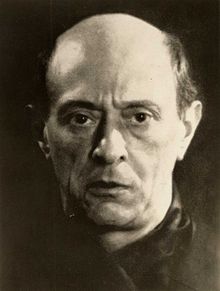Erwartung
| Erwartung | |
|---|---|
| Opera by Arnold Schoenberg | |

The composer in 1927
|
|
| Description | monodrama |
| Translation | Expectation |
| Librettist | Marie Pappenheim |
| Language | German |
| Premiere | 6 June 1924 New German Theatre, Prague |
Erwartung (Expectation), Op. 17, is a one-act monodrama in four scenes by Arnold Schoenberg to a libretto by Marie Pappenheim. Composed in 1909, it was not premiered until 6 June 1924 in Prague conducted by Alexander Zemlinsky with Marie Gutheil-Schoder as the soprano. The opera takes the unusual form of a monologue for solo soprano accompanied by a large orchestra. In performance, it lasts for about half an hour. It is sometimes paired with Béla Bartók's opera Bluebeard's Castle (1911), as the two works were roughly contemporary and share similar psychological themes. Schoenberg's succinct description of Erwartung was as follows:
In Erwartung the aim is to represent in slow motion everything that occurs during a single second of maximum spiritual excitement, stretching it out to half an hour.
Philip Friedheim has described Erwartung as Schoenberg's "only lengthy work in an athematic style", where no musical material returns once stated over the course of 426 measures. In his analysis of the structure, one indication of the complexity of the music is that the first scene of over 30 bars contains 9 meter changes and 16 tempo changes. Herbert Buchanan has countered this description of the work as "athematic", and the general impression of it as "atonal", in his own analysis.
The musicologist Charles Rosen has said that Erwartung, along with Berg's Wozzeck and Stravinsky's The Rite of Spring, is among the "impregnable" "great monuments of modernism."
...
Wikipedia
